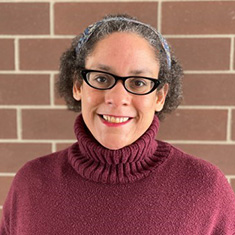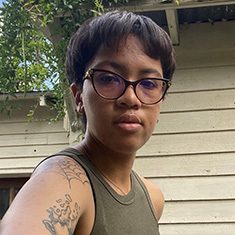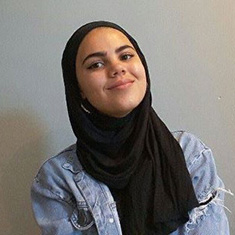Grinnell students become first interns for Black History Research Collective
August 17, 2022 — Growing up in Des Moines, Kari Bassett ’98 experienced Black church through her grandfather, who was the bishop of the Church of God and Christ for the state of Iowa.
 Kari Bassett ’98
Kari Bassett ’98
“This is the Pentecostal section, which is the holy spirit, lots-of-dancing style of Black church,” Bassett explains. In 2017, just before her grandfather died, his Cedar Rapids church was designated an historic place of interest. “This was a fitting ending to his 45-year career,” Bassett says. “I wanted to do this for more Black churches.”
Bassett channeled this desire into reality, forming a nonprofit called The Black History Research Collective (BHRC), an organization committed to identifying Black churches that might be eligible for historic recognition. Starting with the Des Moines area, the research focuses on churches that have been around at least 75 years.
“In the future, I would like to expand our scope to other Iowa churches as well as neighboring states,” Bassett says. “I also want to connect with the church elders who came here during the Great Migration to learn their stories.”
This summer, the collective welcomed their first interns: Grinnell students Evelynn Coffie ’24 from New Orleans and Amani Alqasi ’25 from Bethlehem, Palestine. They focused on “the backlog,” which is all the research that was ready to be handled. Using Trello, a free project management software, to organize their work, they divided it into three main tracks: Web+Branding, Black Churches in Des Moines Built Prior to 1925, and Old Congregations (dating from the 1800s) in New Buildings.
As research unfolded, a fourth track took shape, aptly titled “squirrels.” Explained in the BHRC blog, “Squirrels are topics that we bump into when we’re researching something else. Squirrels are people, events, and movements that are worth some additional research.”
 Evelynn Coffie ’24
Evelynn Coffie ’24
It’s fitting that Bassett’s path leading her to the BHRC has at times resembled this squirrels concept. Majoring in psychology, she burned out in her first post-college job at a residential psychiatric facility. She changed focus, training to be a computer consultant and became fascinated with the technical field while remaining intrigued by the human component.
These interests led to an MBA, after which Bassett returned to Des Moines and worked as a business analyst. “I was the person translating what folks on the business side need to folks actually writing the code,” she explains. “It was interesting to learn about corporate problems and what troubles users have with systems.”
Encountering daily microagressions as the middle person amidst white peers, Bassett pivoted again. “I started imagining what it would look like to work at a place where as a Black woman, I would feel respected.” This vision resulted in the BHRC. “The ‘what’ in this work is the churches, but the ‘why’ is the need for a work environment I can thrive in.”
The research is challenging, as Bassett, Coffie, and Alqasi have to piece together many details due to lack of information.
“The hardest thing in researching Black churches is not knowing who owns them now, or who did before, or why they moved, if they did,” Coffie explains.
They find information about churches and congregations from several resources including the Des Moines Register archives, county assessor sites, and ancestry.com. Another crucial source is The Iowa Bystander, which is the oldest black newspaper west of the Mississippi. Initially, Bassett couldn’t find access to this, but Coffie persevered, accessing it via the Library of Congress.
“There is a lot of rich information out there about Black people, but often times you have to find it on your own, which I’m having to come to terms with,” Coffie says. An English and religious studies double major, Coffie received internship funding that is supported by donors through Grinnell College’s Rosenfield Program in Public Affairs, International Relations, and Human Rights. She didn’t expect to enjoy archival history so much. “I appreciate being able to shine a light on history that people don’t really talk about, particularly around religion and Black people [in Iowa].”
 Amani Alqasi ’25
Amani Alqasi ’25
A computer science major, Alqasi’s focus was divided between database work, research, and designing the logo that now graces the website. Being from Bethlehem, she was drawn to the New Jerusalem Church in Des Moines. But her unexpected squirrel occurred when she discovered that the first mosque in the U.S. was in Cedar Rapids.
“The mosque was built by a local community of immigrants from Lebanon and Syria,” she explains. “They connected with other Muslims and started with just one room designed to resemble a mosque. I am now interested in learning more about Islam in Iowa.”
The internship experience was online, with both students working from their home cities, which brought the challenge of meeting across international time zones. Despite this, they connected twice a day, sharing research discoveries, discussing new squirrel paths, and providing honest, constructive feedback.
“The students have worked well together, and we developed a good team bond,” Bassett says. “The nature of Grinnell students – even generations apart are that we are all kind of weird in the same ways. It makes us compatible. Grinnell is a good place to try to prove this out.”
— by Melanie Drake ’92